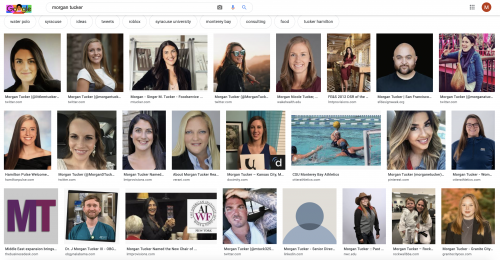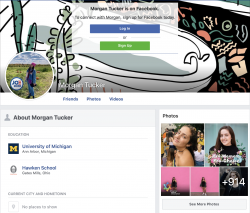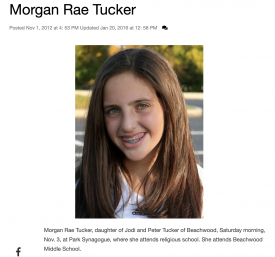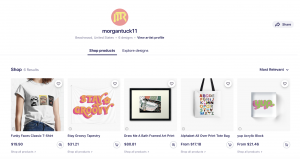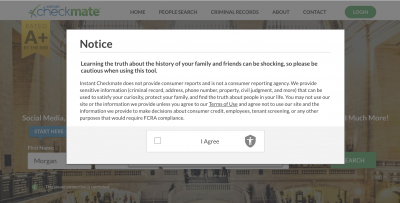Morgan Tucker
Contents
My Data Identity
I like to think of myself as a unique individual. I even won the “most unique” superlative in high school. But according to the web, I am not unique. Well, at least my name is not. Though I feel confident with my identity, in the "infosphere"[1], I am merely lost in the sea of Morgan Tuckers.
Though it is comforting to know I am not easy to find online, it is concerning that the information found about me does not paint an accurate picture of who I am. The internet cannot keep up with the speed at which my personality, values, and mind changes and evolves; information and data on the internet about me is inaccurate, outdated, and missing crucial pieces that make up my true, complete self resulting in a skewed representation of me.
Online Presence Backstory
Like all overprotective parents in the 2000s, my parents were worried about my online activity. They did not even want me to have a Webkinz account. So, when I was finally allowed to have an iPad, they made it clear that I was not allowed to get social media. Of course, I went against their wishes and secretly created Instagram and Twitter accounts. But I did follow one rule: never use my last name. So most of my accounts are under Morgan Tuck or Morgan T. These decisions from the past have now contributed to the difficulty in finding information about me with a simple search.
Who I am According to Google
Nope, You’ve Got the Wrong Person
Searching myself online led to the discovery that much of the information is about other people with my name or misrepresentative of accomplishments, resulting in an inaccurate online identity.
search: 'morgan tucker'
My first Google search was sweet and simple: "morgan tucker". A link to a search of Morgan Tuckers on Facebook shows up on the first page of the google search. When I clicked on this, my actual Facebook page was the 78th result of the search. That means that there are 77 accounts before mine that could be mistaken for me. This concerns me not only because when I am older, my long-lost college friends will not be able to find me on Facebook, but people can find information that they believe is about me, but is actually about someone with the same name.
After this, I went back to the initial Google search and went straight to the Images tab because I wanted to see if photos of me showed up. There were no photos of me, just people that could be mistaken for me. There is nothing wrong with anyone that shows up in the images, but I would appreciate it if a photo of the real me appeared in this search. It is hard to make sense of information on the internet, especially without the ability to put a face to the data.
search: 'morgan tuck'
I had big hopes that searching "morgan tuck" would lead to most of my social media profiles because my username is almost always morgantuck11. However, the only person that showed up for every page of results was a WNBA player. This is inaccurate information because not only is this person not me, but I have been ordered by my doctor to never pick up a basketball again after two concussions in one high school basketball season.
search: 'morgan tucker hawken'
I began to think I would be more successful with my findings by narrowing my search to my name and high school. This search brought me to an archived article on my high school’s website. The article discusses a youth panel I was selected to participate in for the Jewish Federation. As exciting as it is to be highlighted for achievements, the article does not explain what was expected of me on the panel accurately. It states “Panelists are expected to commit to one Sunday per month, host an Israeli teen, travel to Israel, and lead a community project”, and all I had to do was commit to one Sunday a month. This article allows people to think that I have had all of these experiences such as hosting someone from Israel and going to Israel as a teen, but this is not true and was not the essence of the work I did with the panel.That Was The Old Me
When I finally discovered information about me, it was outdated leading to a representation of my old self which is no longer who I am as I have evolved and changed.
search: 'morgan tucker hawken'
Including my school on the search also leads to a page indicating that I received a bronze medal award for a Spanish test. I have since forgotten all of the Spanish I learned and no longer take Spanish classes, so this is not a representation of who I am now.
search: 'morgan tucker beachwood'
I included Beachwood, my hometown, in a search to see if this would find anything. Beachwood City Schools is also the name of the school system I attended until high school. This search brought up my Bat Mitzvah announcement from 2012 in The Jewish News. The announcement says I attend Beachwood Middle School, no longer true as I am a twenty-one-year-old college student, and says I have not had my Bat Mitzvah yet. It also includes my middle name, my parents' names, and the synagogue I belong to.
Not The Whole Story
Even information that is accurate and up-to-date online creates an incomplete story because it still leaves out crucial parts of who I am.
search: 'morgan tucker hawken'
Including my school in the search brings up my Facebook page because I have my high school in my bio. When someone who is not my friend on Facebook goes to my page, the first image they see is my profile photo which has a sticker that states I voted for Joe Biden. The second photo they see is an older profile picture with a sticker indicating I am pro-choice. These photos with stickers show I am politically active and believe in reproductive rights, however, they do not show all of the learning and hard work I have done to help encourage voter turnout and create social change.
search: 'morgan tucker redbubble'
I created a RedBubble shop so I could make money from what I love to do. When looking at my Redbubble, one can see my funky art style and design skills. Though RedBubble gives me a platform to sell my art, it does not convey the amount of time, energy, and thought that goes into my work. It does not show the days I feel no motivation and have zero ideas. Though it allows me to show the world my art, it is not the whole story of the artist. Also, my art style is bound to change, so this will soon be outdated.
search: 'morgan tucker checkmate'
I decided to look myself up on Checkmate to see how accurate the information was. I had never looked myself on a data broker website, so I was unsure what to expect. The website kept showing me warnings that some of the information I find may be surprising to read, and I had to check a box acknowledging this. I felt unsettled and nervous, hoping I would not discover I was secretly adopted.
I looked at as much as I could before it made me create an account. Checkmate knows my full name, my address, the types of online accounts, and my father, mother, and grandfather's names. Though Checkmate provides my address, it cannot encapsulate what my home means to me, and how it is an integral part of who I am. Checkmate does not mention that this address is where I first learned to ride a bike, had birthday parties, had my first sleepover, lost my first tooth. Providing an address is not the same as conveying the importance of home. Similarly, it knows my family member's names but does not convey how much I value family.
Concluding Thoughts
I am constantly changing and adapting just like the internet, so my online identity contains inaccurate aspects, information that is no longer true, and it is missing crucial pieces.
Living in an online world, I try my best to portray myself accurately online. This allows me to feel like I have some control in this uncontrollable world. However, the internet cannot keep up with my evolution as a person, and can never portray all that is me. To get to know someone, you need to spend time with them, speak to them, and interact with them. Internet personas need to be taken with a grain of salt because pixels on a screen do not portray the whole picture.References
- ↑ Floridi, Luciano. Information and Computer Ethics. Cambridge University Press, 2010.
